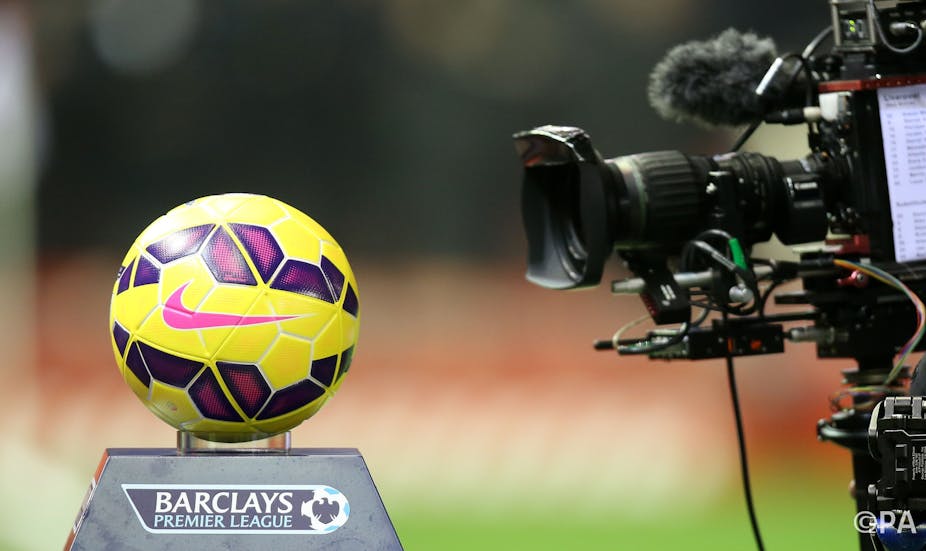The astonishing £5.136 billion Premier League TV rights deal has led to calls for away ticket prices to be slashed and more cash pumped into grassroots football.
One of these could well happen – but the other is highly unlikely.
To be clear, the Premier League is a private company that acts on behalf of 20 shareholders – the football clubs. Chief executive Richard Scudamore’s job is to make as much money as possible for his members. The fact he negotiated an increase in 70% on the value of domestic TV rights for a three-year period from the 2016-17 season this week suggests he is extremely good at his job.
To get a sense of this phenomenal upward trajectory, the value of live Premier League TV rights stood at £1.782 billion for 2010-13 and £3.018 billion for 2013-16.
The bottom line
At the bottom line, the Premier League is a media product – a TV show – and the central purpose is to improve the spectacle and make it even more attractive to broadcasters and advertisers. Premier League football is the perfect soap opera whose unpredictability and drama is hugely addictive for football fans.
The Premier League does not need to be the best league in the world – it just has to be the most entertaining. The formation of the Premier League was inseparable from TV and fans at stadiums are an integral part of the show. The chanting, the protest banners and, of course, the rivalry between clubs. To spice up the spectacle, broadcasters require the conflict between home and away fans.

With this in mind, it is easy to see how the Premier League could get to a point where it leans on clubs struggling to fill away allocations to cut ticket prices. Empty seats are not a good look for television. They create a feeling that if people do not want to watch the game at the stadium, then why should the armchair fan bother? Anything less than full stadiums reduces the glamour and glitz of the TV spectacle and so lessens the desirability of the Premier League among viewers.
What about the grassroots?
High-profile pundits including Gary Lineker, Gary Neville and Jamie Carragher have called for more investment in grassroots football in England following the amount spent on TV rights. There is little financial incentive for this, however. Clubs would need to see it as a social and moral responsibility in terms of giving something back to a sport that has proven such a substantial cash cow for them.
The Premier League simply distributes the money earned from selling TV rights among the clubs. Some sort of collective action by clubs would be required to increase the 3% of revenues spent on community programmes and facilities. Considering the international and diverse nature of ownership, this is not very likely to happen. Ultimately, shareholders see improving grassroots football as expenditure rather than investment.
With so much money at stake, Scudamore’s focus cannot afford to be on much other than improving the product in order to boost the value of TV rights further still.
Besides, it could be argued whether such a lucrative TV deal should shift the responsibility for grassroots facilities away from the government and the game’s governing body, the FA. It is also unrealistic to expect the government to intervene with how the Premier League runs its business given that its footballers produce more than £1 billion in taxes and wages are set to increase further once the newly brokered TV deal kicks in.
Fan activism
This means change to the Premier League’s business model must come from fan activism – supporters’ groups working together and mobilising themselves. So far, models such as FC United – formed in 2005 out of protest against the owners at Manchester United – have tended to be about rejection of the Premier League rather than reformation. Can we envisage a fan or community ownership model at a lower league club exerting some kind of say over how TV rights are spent by gatecrashing the Premier League party via promotion?

There is also the option to exert pressure on the Premier League through attempts to sabotage its value as a media product. Supporters can take a stand and stay away from stadiums or viewers can vote with their remote controls and cancel TV subscriptions.
Sky and BT Sport will need to be sensitive with their pricing structures and are likely to also try and absorb their significant outlay for Premier League rights through cost-cutting exercises. Fans may also attempt to meet any hikes in live TV football subscriptions by dropping other add-ons to their packages or making wider adjustments to household costs. We could be about to find out exactly how addictive the Premier League really is.

